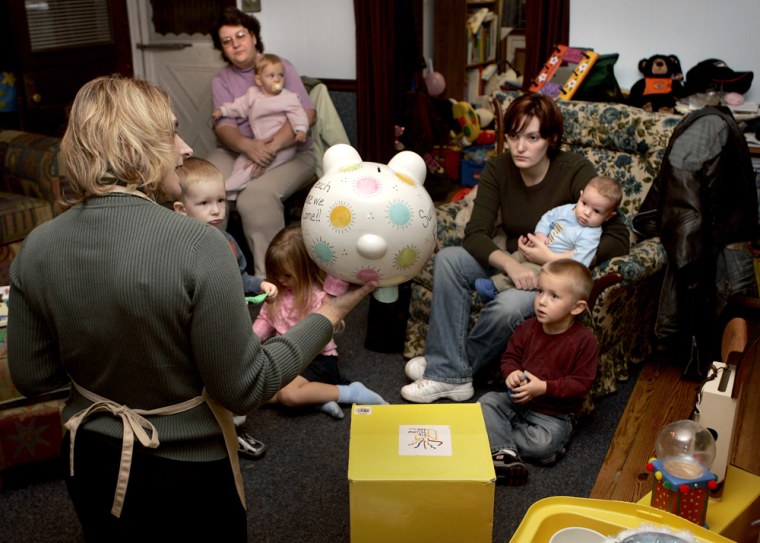Julie Spreckels used to just shop catalogs and the mall. But lately, she’s shopping in someone else’s living room.
The Levittown, N.Y., resident, recently bought $100 worth of Lillian Vernon products like holiday candy dishes at a party thrown by a company consultant.
“I like going to stores, but this is definitely a nice alternative,” said Spreckels, 33. “The service is not the same at a store. Here, there’s a personal touch. And I am open to buying more products.” As a mother of two small children, it’s a “pain” to go to the mall, she noted.
Lillian Vernon is among a growing number of companies that are embracing direct selling, targeting female shoppers — particularly time-starved young mothers like Spreckels — who are growing dissatisfied with service at stores. These companies see big opportunities to grab new and younger customers and get existing ones to spend more in a more relaxed environment.
Products “come to life when a consultant romances the product samples they bring,” said Kevin Green, chief marketing officer at Lillian Vernon, a purveyor of monogrammed clothing and accessories. The direct selling business, started only a year ago, could be bigger than its Internet or catalog businesses, Green said.
The moves are occurring as the $30 billion direct selling industry is trying to shake off its dowdy image while pitching itself as a viable way to make money. Even Tupperware Corp., which ushered in the advent of the home selling party in the 1950s, has scrapped boring storage bins for edgier items like plastic wine glasses in rich jewel tones. The company has recently thrown star-studded Tupperware parties, with celebrities like rapper Ice-T as guests.
“A lot of people are getting a much different look at direct selling, based on a variety of products being sold now — and the selling opportunities,” said Amy Robinson, a spokeswoman at Washington-based Direct Selling Association.
Companies are also looking at direct selling as a more profitable way to reach customers, says Marcela Speert, an industry consultant. Overhead and other fixed costs are lower because there are no stores involved and consultants work on commission, she said.
The U.S. direct sales industry, which includes in-home and door-to-door selling, has nearly doubled from $16.55 billion in sales in 1994 to $29.55 billion in 2003, according to the DSA. Figures were not available for 2004. Annual sales growth averaged 7.1 percent during the 10-year-period, surpassing traditional retailers’ average of 5.4 percent. At-home selling accounts for 62 percent of the total direct sales market.
Consultants earn up to a 50 percent commission and commissions on sales from consultants they recruit. The party hosts, who are recruited by the consultants, earn free products or discounts on items.
The work is becoming more attractive for women, who make up 80 percent of the 13.3 million direct selling work force, which has more than doubled since 1994.
Only 8 percent of consultants make over $50,000, according the DSA, but consultants say the job offers decent income opportunities and flexibility.
Jen Rosengrant, 37, started selling for Crayola’s Big Yellow Box direct selling division a year and a half ago and is now quitting her full-time job as a recruiter. The Richland, Pa., resident, who is now Crayola’s top selling consultant, said her earnings have “beat expectations,” though she declined to say how much she makes.
Staci Fabiani, 35, who is now Lillian Vernon’s top seller, said she is making close to what she made as a teacher. But working only 20 hours a week, the job has allowed her more time with her three young children, she said.
“I didn’t know how much opportunity it could give you,” the Franklin Square, N.Y., resident said.
Executives from various companies said initially there were some concerns among stores — their own and ones they sell products to — that their entry into direct selling would sabotage their business. But those worries seem to be subsiding.
Some companies like Crayola are selling a new line of products under the same brand, others like Lillian Vernon and Body Shop are offering a subset, and a few are creating a new brand. In March, Nine West Apparel, a division of Jones Apparel Group Inc., will launch Million Wishes, an accessories collection that will be sold through consultants.
Mark Bosworth, vice president and general manager for The Body Shop International’s At Home U.S. division, said that the company has been able to show the stores actually benefit from having a strong direct selling business nearby.
“Consultants have a good relationship with the store. They talk to each other. This all builds brand awareness,” Bosworth said.
At home sales help lure a new customer, executives said.
Lillian Vernon’s Green noted that its direct selling division called Celebrations is attracting women in their early 30s, compared to its catalog business, whose customers’ ages average in the mid-40s.
And the parties give retailers a chance to get to truly understand their shopper.
“This gives us the ability to interact with the consumer,” said Kimberly Grayson, senior vice president of Aerosoles, the shoe brand owned by Aero Group International, Inc.
A deeper understanding of its customer has helped the company create shoes that are both comfortable and stylish, she said.
The company can always find out the best sellers through its stores and its Web site, said Grayson, but through these parties, it can “learn the why she is buying.”
